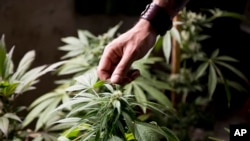Uruguay's Senate is expected to pass a law on Tuesday making the South American country the world's first to legalize the production and sale of marijuana under state control.
Congress' lower house already approved the pioneering bill, which is easily expected to pass the Senate because the ruling coalition controls both chambers.
It will authorize the production, distribution and sale of cannabis, allow individuals to grow their own on a small scale, and provide for clubs of consumers - all under state supervision and control.
The law is an initiative of President Jose Mujica, a 78-year-old former leftist guerrilla who acknowledges the approach is an experiment, says he personally hates pot and has never smoked it.
Ethan Nadelmann is executive director of the New York-based Drug Policy Alliance, a leading sponsor of drug policy reform. He told VOA Uruguay's move is "a truly historic moment."
"It's the first country in the world to move forward with legally regulating marijuana as opposed to persisting with the failed prohibitionist policies of the past. Washington and Colorado last year became the first two political jurisdictions in the world to vote to legalize marijuana," he said. "Uruguay now becomes the first nation-state to do so."
Uruguay's attempt to undo drug trafficking is being followed closely in Latin America where the legalization of some narcotics is being increasingly seen by regional leaders as a possible way to end the violence spawned by the cocaine trade.
"What you see more broadly around Latin America is a growing discontent with the global war on drugs and with the aggressive U.S. posture," he said.
The use of marijuana is legal in Uruguay but cultivation and sale of the drug are not.
Other countries have decriminalized marijuana possession and the Netherlands allows its sale in coffee shops, but Uruguay will be the first nation to legalize the whole chain from growing the plant to buying and selling its leaves.
Several countries such as Canada, the Netherlands and Israel have legal programs for growing medical cannabis but do not allow cultivation of marijuana for recreational use.
Polls show two-thirds of Uruguayans oppose the plan, which faces fierce opposition from conservatives.
Critics say legalization will increase consumption and open the door to harder drugs, but Mujica said his government's goal is to combat organized crime and reduce drug use.
The bill gives authorities 120 days to set up a drug control board that will regulate cultivation standards, fix the price and monitor consumption limits, such as the 40 grams a month any adult will be able to buy from pharmacies.
Uruguay Set to Legalize Marijuana Trade
- By Mark Snowiss





